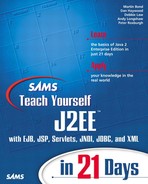Naming Conventions
Each naming service has its own mechanism for supplying a name. Perhaps the most familiar naming convention is that of DNS, where every machine connected to the Internet has a unique name and address. Most readers should recognize the following as a host name used by DNS:
In contrast, LDAP names are based on the X.500 standard and use distinguished names that look like the following fictitious example:
cn=Martin Bond, ou=Authors, o=SAMS, c=us
This format will also be familiar to users of Microsoft's Active Directory service, whose naming system is also based on X.500 but uses a forward slash to separate the various name components:
cn=Martin Bond/ou=Authors/o=SAMS/c=us
These last two naming conventions have similarities in that they are both hierarchically structured with the most specific name occurring first and the most general name (or context) occurring last.
JNDI provides classes that support creating and manipulating structured names; but most programmers will use simple strings that JNDI passes on to the underlying service with minimal interpretation.
Some JNDI Service Providers may use names that are case sensitive, and some service providers may not, it all depends on the underlying technology and environment. To maintain portability of your applications, it is always best to avoid names that differ only by letter case and also ensure that names are always spelled in a consistent manner.
